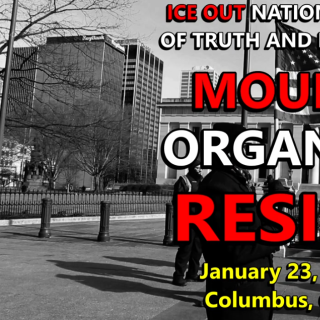I had the opportunity to visit immigrants in detention centers at our country’s border and witness their experiences. Big Kellie and little Kellie, founders of Love without Lines, and myself, the founder of 1DIVINELINE2HEALTH, saw firsthand 250 folks sleeping on concrete floors and in 20 tents at the bridge. Some of the people had not begun their immigration paperwork, while others were awaiting their date to meet with an official.
We worked for a week with the Angry Tías and Abuelas (aunts and grandmothers) and the Brownsville Team who feed the immigrants twice a day and provide for their basic needs. Thanks to the generosity of charitable Columbus residents, we brought with us hygiene products for the families, including zinc oxide, diapers and waterproof diapers for babies with fungal infections.
At the border between Brownsville, Texas and Mexico, I saw how the human rights of poor and hurting displaced families are violated on a daily basis. I noticed the similarity to my work with human trafficking victims on Sullivant Avenue. Historically, local and international leaders have created systemic poverty, racism, sexism, oppression and other unequal treatment to isolate people and make them believe they have no self-worth.
News flash – not one of the asylum seekers belonged to a gang or was a drug or human trafficker. We saw families, a young woman with a disability, transgender folks, community activists, professors and professionals from Central and South America, Cuba and Haiti – all claiming their human rights had been violated by their countries. They arrived on the southern border in hope of a promising future in the United States.
On the Mexican bridges, we witnessed how law enforcement and other officials deprived the immigrants of their basic needs. There were no portable toilets, showers, sinks or running water. The conditions at the border have been described as “crimes against humanity.”
There is no national response team to address the socioeconomic and health crisis on the border of Mexico. Mexico’s President Andres Lopez Obrador is doing nothing to help the asylum seekers, nor are the Central and South American leaders of countries people are fleeing. Many asylum seekers report the shelters are unsafe and crowded. They have become dens for human traffickers to lure people by offering food at a farm. Unfortunately, the immigrants end up in prostitution and killed for their organs. Organ harvesting has become a lucrative business. Drug traffickers kidnap immigrants to be used as transport mules for drugs through their orifices, with the risk of overdoses if the condom or glove breaks.
On this trip I was compelled to speak my native language, Spanish, with the asylum seekers. Spanish is one of the romance languages, but there was nothing romantic about the traumatic stories I was told. The neglect, war crimes and persecution caused by tyrant leaders has led many to exile their native country. Some have been ostracized in their countries and others had been tortured for their political beliefs or belonging to a LGBQTA+ group.
The detention centers are dehumanizing, like many others that exist abroad. As of 2017, the United States has the largest amount of detention centers in the world, according to the Global Immigration Detention Project.
The estimated cost of an adult in one of these facilities is $150 a day. Luke Darby, a GQ contributor and journalist reports “The daily cost for a child in a detention camp is more than a stay in a deluxe room at the Trump International Hotel in Washington, D.C.” Last year, the Border Patrol received international criticism and outrage when the children were separated from their parents, but nothing has changed. While I was there, two desperate mothers willingly offered their babies to me.
Ellis Island, located 13 miles from the New York Harbor, operated as a detention center for 60 years and the immigrant families were kept together. Now, the US has created a generation of children with separation anxiety, which affects the mental health of all those involved. According to the Adverse Child Experiences research, traumatic experiences adversely affect the neurological, social, emotional and cognitive development of children. In addition, even as an adult, children experiencing this type of trauma often display higher health risk behaviors that can result in more severe mental health problems and diseases, and this can lead to early death.
US detention centers, like local governments, have historically needed to have lawsuits to implement changes. In 1985, the Reagan administration faced a lawsuit brought on behalf of minors deprived their basic needs by immigration authorities. In 1997, the Clinton administration closed the lawsuit and the Flores Agreement was formed. The US set nationwide standards for the detention, treatment and released minors held by the Immigration and Naturalization Service, now known as U.S Citizenship and Immigration Services.
However, in 2017 a district court ruling found the government was violating the Flores Agreement by keeping minors in unsafe and unsanitary conditions once again. The court held that “sanitary” specifically meant that the children should receive toothbrushes, soap, towels and showers and that “safe” included not overcrowding them, not having them sleep on cement floors, and feeding them edible food.
The Angry Tías and Abuelas and the Brownsville Team deserve our praise and gratitude for their amazing grassroots efforts to care for the now-500 folks detained on the Brownsville Texas border. They are 100 percent community-funded and solution-driven. Mexican and US leaders need to fund their efforts to prevent any more human rights violations.
We would like the Statue of Liberty’s message to become a reality: "Give me your tired, your poor, your huddled masses yearning to breathe free, the wretched refuse of your teeming shore. Send these, the homeless, tempest-tossed to me, I lift my lamp beside the golden door!”
1DIVINELINE2HEALTH is a grassroots organization that strives to form bridges to resources and spread love to the needy. We work to tear down walls and promote world peace, safety and love in your neighborhoods, create unity and end human suffering. Love protects the most vulnerable souls by forming a decorative border on the tapestry of freedom. Love is capable of tearing down the imaginary borders and real walls built by local and government officials.




